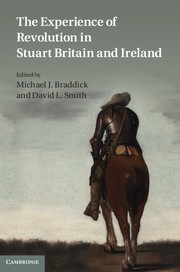Book contents
- Frontmatter
- Contents
- Notes on contributors
- Preface
- List of abbreviations
- JSM
- Introduction: John Morrill and the experience of revolution
- 1 The Scottish–English–Romish Book: the character of the Scottish Prayer Book of 1637
- 2 Popery in perfection? The experience of Catholicism: Henrietta Maria between private practice and public discourse
- 3 Sir Benjamin Rudyerd and England's ‘wars of religion’
- 4 Rhetoric and reality: images of Parliament as Great Council
- 5 Cathedrals and the British Revolution
- 6 History, liberty, reformation and the cause: Parliamentarian military and ideological escalation in 1643
- 7 Sacrilege and compromise: court divines and the king's conscience, 1642–1649
- 8 Law, liberty, and the English Civil War: John Lilburne's prison experience, the Levellers and freedom
- 9 On shaky ground: Quakers, Puritans, possession and high spirits
- 10 James Harrington's prescription for healing and settling
- 11 ‘The Great Trappaner of England’: Thomas Violet, Jews and crypto-Jews during the English Revolution and at the Restoration
- 12 The Cromwellian legacy of William Penn
- 13 Irish bishops, their biographers and the experience of revolution, 1656–1686
- 14 Religion and civil society: the place of the English Revolution in the development of political thought
- Bibliography of the major writings of John Morrill, 1967–2009
- Index
JSM
A tribute to a friend
Published online by Cambridge University Press: 05 August 2011
- Frontmatter
- Contents
- Notes on contributors
- Preface
- List of abbreviations
- JSM
- Introduction: John Morrill and the experience of revolution
- 1 The Scottish–English–Romish Book: the character of the Scottish Prayer Book of 1637
- 2 Popery in perfection? The experience of Catholicism: Henrietta Maria between private practice and public discourse
- 3 Sir Benjamin Rudyerd and England's ‘wars of religion’
- 4 Rhetoric and reality: images of Parliament as Great Council
- 5 Cathedrals and the British Revolution
- 6 History, liberty, reformation and the cause: Parliamentarian military and ideological escalation in 1643
- 7 Sacrilege and compromise: court divines and the king's conscience, 1642–1649
- 8 Law, liberty, and the English Civil War: John Lilburne's prison experience, the Levellers and freedom
- 9 On shaky ground: Quakers, Puritans, possession and high spirits
- 10 James Harrington's prescription for healing and settling
- 11 ‘The Great Trappaner of England’: Thomas Violet, Jews and crypto-Jews during the English Revolution and at the Restoration
- 12 The Cromwellian legacy of William Penn
- 13 Irish bishops, their biographers and the experience of revolution, 1656–1686
- 14 Religion and civil society: the place of the English Revolution in the development of political thought
- Bibliography of the major writings of John Morrill, 1967–2009
- Index
Summary
I first met John Morrill in February 1974. David Underdown had arranged lunch with Christopher Hill and we arrived on the Oxford train an hour before the appointed time. Underdown led me over Worcester bridge and on to Broad Street. But instead of turning into Balliol he took me through an almost unseen gate that led to the warren of buildings that comprised Trinity College. We entered one of them; he knocked at a door, and upon a muffled response opened it. Behind billows of pipe smoke sat John Morrill at work on a thick stack of papers. When he saw David his face lit up with a smile of almost preternatural warmth, his eyes revealing genuine pleasure at Underdown's unexpected arrival. I crossed the threshold hesitantly since I still had no idea as to the purpose of our detour. In his usual laconic way Underdown simply said, ‘you two should know each other’, and pronounced our names, Morrill's resonating immediately in my historiographical memory, mine as yet meaningless to him. John regretted, as he would habitually in future years, that he was pressed for time, but immediately made us welcome. After an exchange of pleasantries with Underdown he turned his attention to me and asked what I was working on. I delivered a hundred-word synopsis of my doctoral research (which, further pared, made its way into a footnote in The Revolt of the Provinces the next year). John asked a question or two, looked at his watch and put on his gown to go off to teach. But as he was ushering us out he said to me, ‘You must come back and visit again. We have much to talk about.’
- Type
- Chapter
- Information
- The Experience of Revolution in Stuart Britain and Ireland , pp. xvii - xxxviPublisher: Cambridge University PressPrint publication year: 2011

